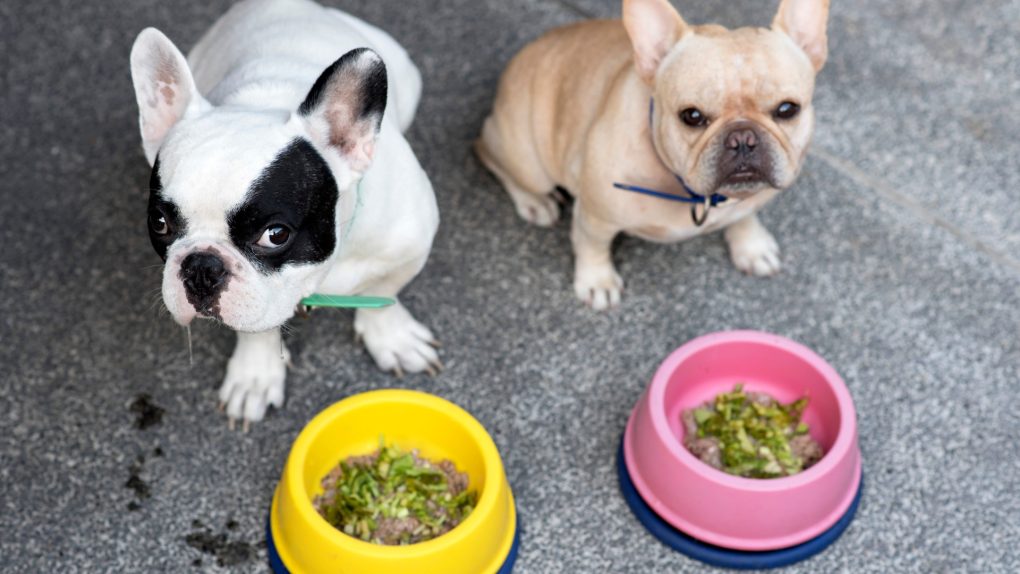French Bulldog Pregnancy: What to Expect and How to Care for Your Pregnant Frenchie
French bulldogs are a popular breed of dog known for their affectionate and playful nature. However, breeding these dogs can be a complex process that requires proper planning and care. One important aspect of breeding French bulldogs is understanding their pregnancy and how to properly care for the mother and her puppies.


French bulldogs require special care and attention during pregnancy to ensure a safe and healthy delivery. It is important to monitor the mother’s weight and nutrition and provide regular veterinary check-ups to detect any potential health issues. Additionally, understanding the signs of labor and being prepared for delivery can help ensure a successful birth and healthy puppies. Proper care and planning during pregnancy can help ensure the health and well-being of both the mother and her puppies.
Table of Contents
Signs of Pregnancy
French bulldogs are among the most popular dog breeds, and many owners are interested in breeding their pets. Knowing the signs of pregnancy can help owners prepare for the arrival of new puppies and ensure that their pregnant dog is healthy and comfortable.
Physical Changes
One of the most obvious signs of pregnancy in French bulldogs is a change in their physical appearance. As the pregnancy progresses, the dog’s belly will become larger and firmer. This change is most noticeable around the fifth week of pregnancy.
Other physical changes that may occur during pregnancy include:
- Enlarged nipples: The dog’s nipples will become larger and darker in color.
- Increased appetite: Pregnant dogs may eat more than usual.
- Weight gain: The dog may gain weight as the pregnancy progresses.
- Nesting behavior: The dog may start to prepare a nest for her puppies.


Behavioral Changes
In addition to physical changes, pregnant French bulldogs may also exhibit behavioral changes. These changes can include:
- Increased affection: The dog may seek more attention and affection from her owner.
- Restlessness: The dog may have trouble settling down and may pace or whine.
- Decreased activity: The dog may become less active as the pregnancy progresses.
- Protective behavior: The dog may become more protective of her owner or nesting area.
It’s important to note that not all dogs will exhibit these signs of pregnancy, and some dogs may exhibit signs not listed here. However, if you suspect your French bulldog is pregnant, it’s important to consult with a veterinarian to ensure proper care throughout her pregnancy.
Prenatal Care
French bulldog pregnancy requires proper prenatal care to ensure the health of both the mother and the puppies. This section will cover the essential aspects of prenatal care, including veterinary visits, diet and exercise, and supplements.
Veterinary Visits
Regular veterinary visits are crucial during French bulldog pregnancy. The veterinarian will monitor the mother’s health and the puppies’ development, detect potential problems, and provide necessary treatments. The following table shows the recommended veterinary visits during French bulldog pregnancy:
| Stage of Pregnancy | Veterinary Visit |
| 3-4 weeks | Confirm pregnancy |
| 5-6 weeks | Ultrasound to confirm fetal viability |
| 7-8 weeks | X-ray to count fetuses |
| 9 weeks | Pre-delivery checkup |


Diet and Exercise
A balanced diet and regular exercise are essential for the mother’s and puppies’ health during French bulldog pregnancy. The following tips can help ensure proper diet and exercise:
- Feed the mother a high-quality, balanced diet of protein, vitamins, and minerals. Avoid overfeeding, as it can lead to obesity and other problems.
- Provide fresh, clean water at all times.
- Avoid strenuous exercise, but encourage moderate exercise, such as short walks, to maintain muscle tone and overall health.
- Avoid exposing the mother to extreme temperatures, which can harm the puppies.


Supplements
Supplements can help ensure the mother and puppies receive the necessary nutrients during French bulldog pregnancy. The following supplements are recommended:
- Prenatal vitamins: Provide essential vitamins and minerals, such as folic acid, calcium, and iron, to support the mother’s and puppies’ growth and development.
- Omega-3 fatty acids: Support brain and eye development in the puppies.
- Probiotics: Help maintain a healthy gut flora and prevent digestive problems.
In conclusion, proper prenatal care is crucial for French bulldog pregnancy. Regular veterinary visits, a balanced diet, exercise, and supplements can help ensure the mother’s and puppies’ health.
Complications
French bulldog pregnancy can sometimes be associated with complications. In this section, we will discuss some of the common complications that can arise during French bulldog pregnancy.
Miscarriage
Miscarriage, also known as spontaneous abortion, is the loss of a pregnancy before the 45th day of gestation. Miscarriage can occur for various reasons, including hormonal imbalances, infections, and genetic abnormalities. Symptoms of a miscarriage in French bulldogs include vaginal bleeding, abdominal pain, and the passing of fetal tissue. If a miscarriage occurs, it is important to seek veterinary attention immediately.
Dystocia
Dystocia, or difficult labor, is a common complication of French bulldog pregnancy. Various factors, including fetal size, maternal pelvic size, and uterine inertia can cause dystocia. Symptoms of dystocia include prolonged labor, weak contractions, and the inability to deliver puppies. Dystocia can be a life-threatening condition for the mother and her puppies, requiring immediate veterinary attention.
C-Section
Cesarean section, or C-section, is a surgical procedure used to deliver puppies when natural delivery is not possible or safe. C-sections are commonly performed in French bulldogs due to their narrow pelvises and the large size of their puppies’ heads. Symptoms that may indicate the need for a C-section include prolonged labor, weak contractions, and the presence of fetal distress. C-sections are generally safe for the mother and her puppies, but they require a longer recovery time than natural delivery.
French bulldog pregnancy can sometimes be associated with complications. Therefore, it is important to be aware of these complications’ signs and symptoms and seek veterinary attention immediately if they occur. Doing so can help ensure the health and well-being of the mother and her puppies.
Labor and Delivery
Stages of Labor
French bulldog pregnancy typically lasts for 63 days. During the last few days of pregnancy, the dog may become restless, lose appetite, and start nesting behavior. Labor typically begins with uterine contractions, followed by the amniotic sac rupture and the first puppy’s release. The second and subsequent puppies are usually born within 10-60 minutes of the previous one. The entire labor process can last for 6-12 hours, depending on the size of the litter and the individual dog’s condition.
Whelping Box
Preparing a comfortable, clean, and safe whelping box for the French bulldog to give birth in is important. The whelping box should be large enough for the dog to move around and stretch out, but not too spacious that the puppies get scattered or lost. The box should be lined with absorbent materials, such as newspapers, towels, or puppy pads, frequently changed during labor and delivery. The whelping box temperature should be around 80-85°F, and the humidity should be around 55-65%.
Assisting the Birth
Most French bulldogs are capable of giving birth naturally and without assistance. However, monitoring the dog’s progress and intervening if necessary is important. Signs of distress or difficulty during labor include prolonged contractions, excessive bleeding, green or black discharge, or a puppy stuck in the birth canal. In addition, the dog may need veterinary assistance, such as oxytocin injections, manual manipulation, or cesarean section. Therefore, it is important to handle the puppies gently and avoid pulling or twisting them during delivery.
Postpartum Care
After giving birth, the French bulldog may be exhausted, thirsty, and hungry. Providing her with fresh water and high-quality food, such as puppy formula or canned food, is important. The dog may also need to be checked by a veterinarian for any signs of infection, such as fever, lethargy, or discharge. The puppies should be weighed, examined, and kept warm and dry. They should be fed colostrum from the mother’s milk, or a substitute if necessary, within the first few hours of birth to boost their immunity. The whelping box should be cleaned frequently to prevent infection and odor buildup.


Caring for Newborns
When caring for French Bulldog newborns, there are a few key areas to focus on: feeding, temperature control, and weaning.
Feeding
Newborn French Bulldog puppies rely on their mother’s milk for the first few weeks. Therefore, ensuring that the mother produces enough milk and that the puppies are nursing regularly is important. Supplemental feeding may be necessary if the mother is not producing enough milk.
When feeding the puppies, it is important to use a bottle or syringe designed for puppies to avoid choking. Puppies should be fed every 2-3 hours for the first few weeks of their lives.
Temperature Control
Newborn French Bulldog puppies cannot regulate their body temperature and are susceptible to hypothermia. Therefore, it is important to keep the puppies warm by providing a heat source, such as a heating pad or heat lamp. The temperature should be between 85-90 degrees Fahrenheit for the first week of the puppies’ lives and gradually decrease as they age.
Weaning
French Bulldog puppies will transition from milk to solid food around 3-4 weeks of age. Therefore, it is important to introduce solid food gradually and monitor the puppies’ weight to ensure that they are getting enough nutrition.


When weaning, it is important to use high-quality puppy food specifically formulated for their nutritional needs. Puppies should be fed small amounts of food several times a day.
Caring for French Bulldog newborns requires attention to detail and a commitment to meeting their unique needs. Owners can help ensure that their puppies grow up healthy and strong by focusing on feeding, temperature control, and weaning.
